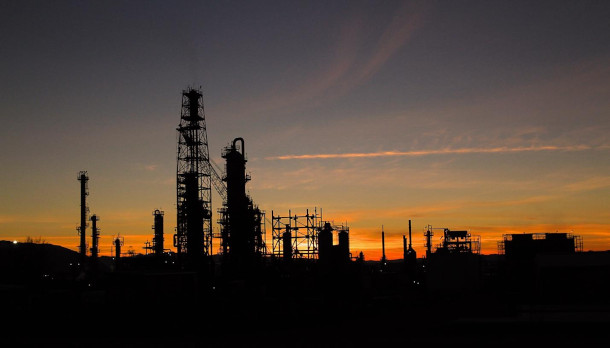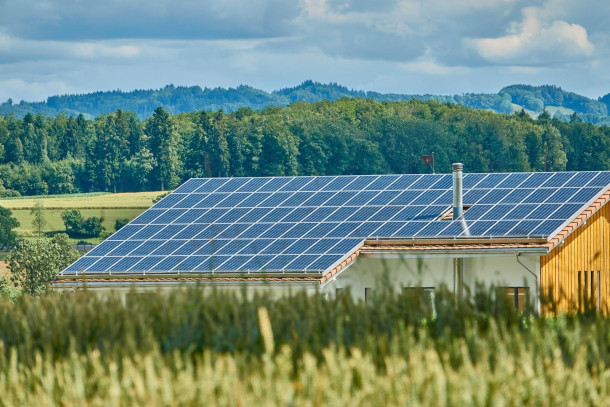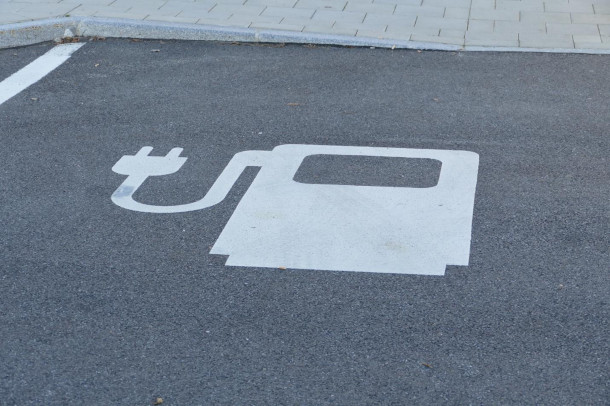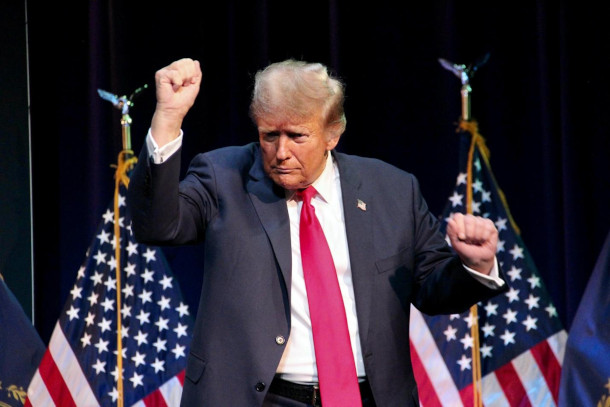Tariffs and Green Energy Cuts
Air Date: Week of May 2, 2025

The Trump Administration favors the fossil fuel industry over the clean energy industry in its tariff policies. (Photo: Arbyreed, Flickr, CC BY-NC-SA 2.0)
The Trump Administration’s on-again, off-again tariffs and cuts to renewable energy programs are bringing instability and uncertainty to the future of US energy. Collin Rees of Oil Change International talks with Host Paloma Beltran about how the trade turmoil and policy whiplash are impacting and sidelining the U.S. renewable energy industry.
Transcript
BELTRAN: The economy ranked as the top concern when voters headed to the polls last November and re-elected President Trump on his promise to end inflation and rev up the U.S. economy. So far, though, it’s been a very rocky start, thanks in part to the many tariffs the President ordered on goods imported from other countries. While some are on a 90 day pause, all imports of aluminum and steel face an import duty tax of 25% as we go to air. Some goods imported from China are facing tariffs of more than 100%. And there’s a 10% tariff on energy from Canada, a major source of energy imports for the United States. Other countries have retaliated with their own tariffs. President Trump says he is exempting fossil fuels from these import duties, which have been shifting rapidly over the past few weeks. Here to talk about the implications for both the fossil fuel and renewable energy industries is Collin Rees, the U.S. Program manager for Oil Change International. Hi Collin and welcome back to the show!
REES: Thanks so much for having me, Paloma.
BELTRAN: So, Collin, over the last few weeks, there's been a lot of inconsistency in terms of U.S. tariffs, a lot of back and forth, ups and downs. What's all of this doing to the fossil fuel market?
REES: It has certainly been a roller coaster. I think, much like the broader economy, the fossil fuel markets haven't particularly known what to do with Trump's tariffs, and in particular with the fact that they are changing day by day. I think that uncertainty, that volatility, is in fact, a feature of fossil fuel markets. Oil and gas in particular, are markets which tend to be extremely volatile in a way that can be really damaging to consumers and the broader economy. To me, this is yet another example of the dangers of being hooked to a fossil fuel economy, of having so much of our lives intertwined with oil and gas in different ways, and the dangers of Trump's policies and others to keep us hooked on that fossil fuel economy.

Recent tariffs are likely to hurt the solar energy industry by increasing the costs of the materials needed to build solar arrays. (Photo: Roy Bury, Wikimedia Commons, public domain)
BELTRAN: And how is this likely going to impact consumers, both at the gas pump and when they're looking at their home energy bills?
REES: It's difficult to predict the tariffs exact impacts on fossil fuels in the short term. I think one thing that we can definitely say is that in the long term, this means higher energy prices for consumers, because wind, solar, energy storage are the cheapest sources of energy available, and this is going to raise the price of renewable energy and hurt the build out. With Trump and others continuing to give preferential treatment to the oil and gas industry, to the fossil fuel industry, that's going to cause the price of renewable energy to go up. And when combined with the regulatory changes and other attacks on renewable energy and boost for fossil fuels, you're slowing the transition to renewable energy. It's not just that the Trump administration is laying the grounds for economic chaos here and raising prices on everyday goods, but it's also slashing many of the federal programs that help working people weather these economic downturns, including things like assistance paying their electricity bills, Medicaid and health assistance, food and housing assistance, even gutting things like FEMA to respond to increased weather disasters and the weather service. These are the parts of the federal government that help communities protect themselves from the fiercer hurricanes, wildfires, droughts, et cetera, all the impacts of climate change, as well as just normal disasters and to rebuild after they hit. And so, I think it's really a double whammy in that not only are they boosting the fossil fuel industry at every turn but also taking away some of the only support systems that many of our communities have to respond to those disasters.
BELTRAN: And what countries are our biggest oil and gas partners, and how are they being impacted?
REES: We have very large oil and gas exports as the United States. We're, in fact, the world's leading exporter of oil and gas combined. Over the last couple of years, we've seen a real increase in exports of gas, and LNG, as it's known, liquefied natural gas, is one form of that gas, being sent to Europe in part due to the impacts of the war in Ukraine and the pressures that has put on the energy system. One thing Europe has done as a result of that war is to aggressively invest in its transition to renewable energy. And so one of the things that the U.S. oil and gas market is sort of coming to terms with is that Europe actually won't need that much gas forever, and in fact, it might not need it for very many more years. And so what we're seeing in the market, in particular in the gas and LNG market, is a pivot toward Asia, an attempt to lock in more contracts with places like Japan, places like South Korea, places like much of Southeast Asia, to offload U.S. LNG, for instance. Asia is sort of the place where the gas market is increasingly looking to grow. So those are the places that are also impacted by these tariffs in many different ways. Already, the economics of importing U.S. LNG was pretty questionable. These are places where it is also much cheaper to build renewable energy in many cases. And so what we're seeing is this diplomatic mishmash of frankly poor economic choices, increased tariffs, which are causing global economic instability, while also diplomatic pressure to be purchasing more expensive and more volatile fossil fuels from the U.S., when, in fact, the solution needs to be transitioning to renewable energy more quickly.

In response to recent United States economic policy, China and the European Union are discussing a partnership which would enable China to export more electric vehicles to Europe. (Photo: Kritzolina, Wikimedia Commons, CC BY-SA 4.0)
BELTRAN: So it sounds like a lot of these countries are expanding in renewable energy and have a lot of renewable energy potential, but they're still importing LNG. Why is that?
REES: The U.S. has spent significant diplomatic and geopolitical resources to pressure other countries to import more LNG. This is something that's a very top priority of the fossil fuel lobby, and it's been something that's been a top priority of Republicans. Certainly, the Biden Administration as well did some of this. But under Trump and Trump's first term and Trump's second term, the international lobbying on behalf of the oil and gas industry has just gone through the roof. And as we've seen, it doesn't even just stop at that kind of public private partnership. A fracked gas CEO is now literally the head of the Department of Energy. Trump is actually bringing in these people into his administration, trying to take us back to last century's energy mix.
BELTRAN: And President Trump appears to be engaged in a trade war with various countries around the world. How is this trade war impacting the fossil fuel industry?
REES: I think that the trade war is probably not welcomed by the fossil fuel industry, frankly. If Trump's trade wars and tariffs do cause a global economic downturn or anything that even that kind of hurts economic growth, what that means is a slowing of demand in the U.S. and across the world often. And so, a slowing of demand means everything slows down. You're not only able to build less renewable energy, you're probably able to build fewer things that rely on fossil fuels, just all growth slows down. And so hyper capitalistic corporations tend to not like that sort of environment. So I think there is a severe danger here that by pursuing whatever motivation he might have, that Trump actually slows down the economy, damages the economy in different ways, that has negative impacts even on his so-called friends in the oil and gas industry, for instance. I think oil and gas are very much pegged to a global market, and so their prices are set at the global level. So even if Trump were to succeed in boosting the U.S. economy, but still damaging the global economy, that wouldn't necessarily be good for U.S. oil and gas. And so I think that's part of the conundrum they're caught in.
BELTRAN: In addition from exempting fossil fuels from his tariff policies, President Trump's policies appear to be harming the clean energy industry. Talk to me about how these trade policies are affecting the renewable energy industry.

President Trump has changed his mind about tariffs several times during his first 100 days in office. (Photo: Liam Enea, Wikimedia Commons, CC BY-SA 2.0)
REES: So Trump's dangerous trade policies and kind of volatile tariffs impact the price of renewable energy. Lot of that is because the raw materials used to build renewable energy products, even for renewable energy products produced in the United States, that means things like steel, aluminum, different parts of solar panels, et cetera, many of those products are produced overseas, in China and in many other places. And so even if you're talking about a U.S. based renewable energy company that's building product here in the United States, they will see their materials costs increase significantly. There's also a decent amount of trade, still. Despite existing tariffs and trade barriers, we do import some solar panels from overseas. Those are produced less expensively than we can do it here in the United States. So, for all these reasons, solar in particular, is impacted, but the same for large wind turbines, bringing in things like large amounts of steel from overseas. Some of the European companies are some of the leading technological innovators in wind energy development. These are all reasons that we'll see renewable energy be more expensive as a result of these trade actions by the Trump Administration. I think it's also important to view this, not in isolation, as only a trade and tariffs attack. We've seen attacks on renewable energy across the board from the Trump Administration. We've seen them freeze funds to support renewable energy build-out and clean manufacturing, to make renewable energy accessible to low-income families. There's been executive orders cracking down on renewables. There's been paused permit approvals for offshore wind. There's executive orders on things like unleashing American energy, which specifically exempt wind and solar. So this has very much been an across the board attack on wind and solar and on other components of the energy transition and its infrastructure, like electric vehicles, charging networks, et cetera.
BELTRAN: And how are other countries responding to these tariffs?

Collin Rees is the U.S. Program Manager for Oil Change International. (Photo: Matt Maiorana)
REES: I think we're seeing countries realize that the United States doesn't necessarily need to be involved here, or that the U.S. is not a reliable trading partner anymore, in particular, in renewable energy and kind of alternative energy sources, but really more broadly as well. One of the things I found really interesting was just within the last couple weeks since the tariffs were announced, the European Union is talking to China about shifting regulations and significantly ramping up the import of Chinese electric vehicles and electric vehicle technology. And I think that's the sort of thing where we could see continued growth in the renewable energy industry and things like electric vehicles overseas, not including the U.S. in any way as a result of these tariffs, as countries realize that they do have alternatives to just United States products.
BELTRAN: Collin Rees is the U.S. Program Manager for Oil Change International. Collin, thank you so much for joining us.
REES: Thanks for having me, it was great to be on.
Links
Living on Earth wants to hear from you!
Living on Earth
62 Calef Highway, Suite 212
Lee, NH 03861
Telephone: 617-287-4121
E-mail: comments@loe.org
Newsletter [Click here]
Donate to Living on Earth!
Living on Earth is an independent media program and relies entirely on contributions from listeners and institutions supporting public service. Please donate now to preserve an independent environmental voice.
NewsletterLiving on Earth offers a weekly delivery of the show's rundown to your mailbox. Sign up for our newsletter today!
 Sailors For The Sea: Be the change you want to sea.
Sailors For The Sea: Be the change you want to sea.
 The Grantham Foundation for the Protection of the Environment: Committed to protecting and improving the health of the global environment.
The Grantham Foundation for the Protection of the Environment: Committed to protecting and improving the health of the global environment.
 Contribute to Living on Earth and receive, as our gift to you, an archival print of one of Mark Seth Lender's extraordinary wildlife photographs. Follow the link to see Mark's current collection of photographs.
Contribute to Living on Earth and receive, as our gift to you, an archival print of one of Mark Seth Lender's extraordinary wildlife photographs. Follow the link to see Mark's current collection of photographs.
 Buy a signed copy of Mark Seth Lender's book Smeagull the Seagull & support Living on Earth
Buy a signed copy of Mark Seth Lender's book Smeagull the Seagull & support Living on Earth

